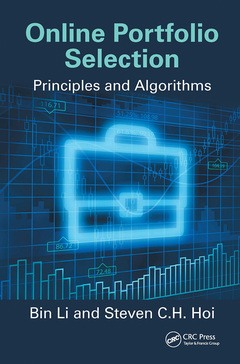Online Portfolio Selection Principles and Algorithms
Auteurs : Li Bin, Hoi Steven Chu Hong

With the aim to sequentially determine optimal allocations across a set of assets, Online Portfolio Selection (OLPS) has significantly reshaped the financial investment landscape. Online Portfolio Selection: Principles and Algorithms supplies a comprehensive survey of existing OLPS principles and presents a collection of innovative strategies that leverage machine learning techniques for financial investment.
The book presents four new algorithms based on machine learning techniques that were designed by the authors, as well as a new back-test system they developed for evaluating trading strategy effectiveness. The book uses simulations with real market data to illustrate the trading strategies in action and to provide readers with the confidence to deploy the strategies themselves. The book is presented in five sections that:
- Introduce OLPS and formulate OLPS as a sequential decision task
- Present key OLPS principles, including benchmarks, follow the winner, follow the loser, pattern matching, and meta-learning
- Detail four innovative OLPS algorithms based on cutting-edge machine learning techniques
- Provide a toolbox for evaluating the OLPS algorithms and present empirical studies comparing the proposed algorithms with the state of the art
- Investigate possible future directions
Complete with a back-test system that uses historical data to evaluate the performance of trading strategies, as well as MATLAB® code for the back-test systems, this book is an ideal resource for graduate students in finance, computer science, and statistics. It is also suitable for researchers and engineers interested in computational investment.
Readers are encouraged to visit the authors? website for updates: http://olps.stevenhoi.org.
Introduction. Principles. Algorithms. Empirical Studies. Conclusion.
Dr. Bin Li received a bachelor’s degree in computer science from Huazhong University of Science and Technology, Wuhan, China, and a bachelor’s degree in economics from Wuhan University, Wuhan, China, in 2006. He earned a PhD degree from the School of Computer Engineering of Nanyang Technological University, Singapore, in 2013. He completed the CFA Program in 2013 and is currently an associate professor of finance at the Economics and Management School of Wuhan University. Dr. Li was a postdoctoral research fellow at the Nanyang Business School of Nanyang Technological University. His research interests are computational finance and machine learning. He has published several academic papers in premier conferences and journals.
Dr. Steven C.H. Hoi received his bachelor’s degree in computer science from Tsinghua University, Beijing, China, in 2002, and both his master’s and PhD degrees in computer science and engineering from The Chinese University of Hong Kong, Hong Kong, China, in 2004 and 2006, respectively. He is currently an associate professor in the School of Information Systems, Singapore Management University, Singapore. Prior to joining SMU, he was a tenured associate professor in the School of Computer Engineering, Nanyang Technological University, Singapore. His research interests are machine learning and data mining and their applications to tackle real-world big data challenges across varied domains, including computational finance, multimedia information retrieval, social media, web search and data mining, computer vision and pattern recognition, and so on.
Date de parution : 01-2024
15.6x23.4 cm
Disponible chez l'éditeur (délai d'approvisionnement : 14 jours).
Prix indicatif 62,51 €
Ajouter au panierDate de parution : 11-2015
15.6x23.4 cm
Thèmes d’Online Portfolio Selection :
Mots-clés :
Follow; Portfolio selection; Price Relative Vectors; Online portfolio selection (OLPS); Portfolio Vector; Optimal portfolio allocation; BCRP; Machine-learning techniques in finance; High Frequency Trading; Cumulative Wealth; Reversion Property; Market Windows; Price Relatives; Hold; Hindsight; Stock Price Relatives; Universal Portfolios; Volatility Risk; CRP; BK; ONS; Up; Expected Log Return; Base Experts; Algorithmic Trading; Bt Xt; Loser Approach; Margin Buying; Reversion Parameter



